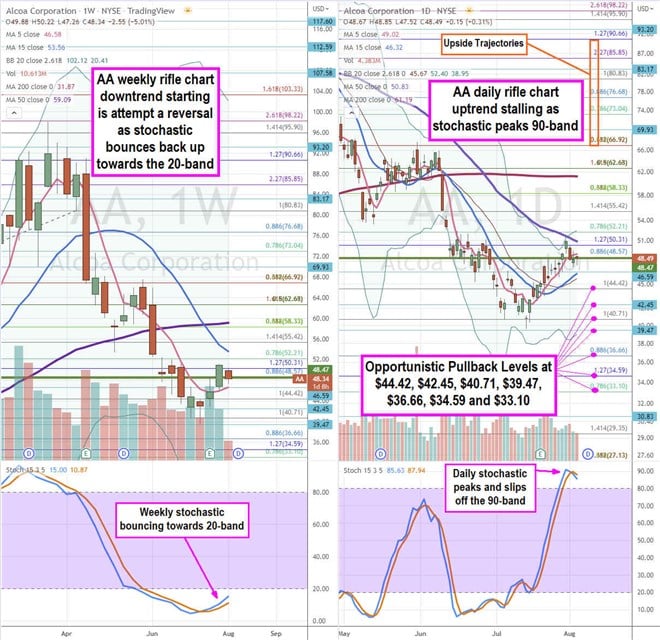Electric Vehicles Can Drive Alcoa Stock Higher Global aluminum and materials products maker Alcoa (NYSE: AA) stock has fallen (-19%) for 2022. Inflationary pressures have cut into margins.
By Jea Yu
This story originally appeared on MarketBeat

- Global aluminum and materials products maker Alcoa stock has fallen (-19%) for 2022
- Shares spiked last year on optimism for the infrastructure bill, which turned out to be a sell-the-news event.
- EVs require more aluminum than regular cars and the EV market is expected to grow at a 23.5% compound annual growth rate
Global aluminum and materials products maker Alcoa (NYSE: AA) has stock fallen (-19%) for 2022. Inflationary pressures prompting rising interest rates have cut into the country's largest aluminum maker's margins. While most people are aware of common uses for aluminum ranging from soda cans and kitchen utensils to foil, window panes, energy, and housing and construction, there's a growing use for them in electric vehicles (EV). Aluminum is a low-density, lightweight, non-toxic, strong and rust-free metal which help creates lighter cars. Shares have fallen over 40% since hitting its highs of $98.09 in March of this year. The Company continues to beat analyst estimates even as they get lowered. Raw materials prices continue to rise and cut into Alcoa's margins.
Alcoa Looks Cheap
Shares spiked last year on optimism for the infrastructure bill, which turned out to be a sell the news event. However, the EV market can power growth as the segment continues to grow. EVs require more aluminum than regular cars. The EV market is expected to grow at a 23.5% compound annual growth rate (CAGR) up to 2028. Shares are trading at just 6X forward earnings making this an almost certain value play. Alcoa also announced a $500 million stock buyback program after beating its Q2 2022 earnings estimates by $0.18 per share. Prudent investors seeking exposure in both the aluminum and EV segment can look for opportunistic pullbacks in shares of Alcoa.
Electric Vehicles Require More Aluminum
The average internal combustion engine (ICE) vehicle had approximately 459 pounds of aluminum in 2020. Light trucks like the Ford F-150 has nearly 550 pounds of aluminum. Higher-end sports cars like the Tesla Model S has over 800 pounds of aluminum. Aluminum is ideal for EVs with its light, non-corrosive, and durable properties. While EV maker Tesla (NASDAQ: TSLA) is leading production, major U.S. automakers like General Motors (NYSE: GM) and Ford (NYSE: F) are going all-in on the future of all-electric powered vehicles. General Motors has committed to spending $35 billion in EV development to introduce 30 models between 2020 and 2025. They expect to build more than 1 million EVs a year in North America and expects to have an all-electric vehicle line-up by 2035. The Biden administration has set a goal of 50% of all new cars to be electric by 2030. The world's second largest automaker, Volkswagen (OTCMKTS: VWAGY) expects at least half its car sales to be electric by 2030.
China is The Largest Aluminum Producer
Alcoa is the largest public producer of aluminum in the U.S., but China is by far the largest producer and consumer of aluminum in the world. The government also subsidizes many of the production elements. The country of 1.3 billion people has the world largest auto sector producing near 30% of global production. China has a largest network of EV Superchargers and EVs have an even lower waiting period than traditional internal combustion engine vehicles. Leading EV makers like Xpeng (NYSE: XPEV) and NIO (NYSE: NIO) are still growing at a double digit clip with a very long runway. Europe follows as world's second largest consumer of aluminum.

AA Opportunistic Entry Levels For Consideration
Using the rifle charts on the weekly and daily time frames provide a precision view of the price action playing field for AA stock. The weekly rifle chart inverse pup breakdown triggered on the rejection of the $66.92 Fibonacci (fib) level. The weekly downtrend is stalling as the weekly 5 period moving average (MA) rises at $46.58 and 15-period MA stalls at $53.56. The weekly stochastic crossed back up with a mini pup towards the 20-band setting up a make or break. The weekly market structure low (MSL) buy triggers on the breakout through $48.34. The daily stochastic made a full oscillation up to the 90-band to peak and slip. The daily uptrend is slowing as the 5-period MA stalls at $49.02 and rising 15-period MA at $46.32. The daily 50-period MA is falling at $50.83 and daily 200-period MA at $63.19 The daily upper Bollinger Bands (BBs) sit near the $52.21 fib level. The daily lower BBs sit near $38.95. The daily is very overbought so it's important not to chase this one as waiting for the daily stochastic is oscillate down. Prudent investors can monitor for opportunistic pullback levels at the $44.42 fib, $42.45, $40.71 fib, $39.47, $36.66 fib, $34.59 fib, and the $33.10 fib level. Upside trajectories range from the $66.92 fib up towards the $90.66 fib level.









